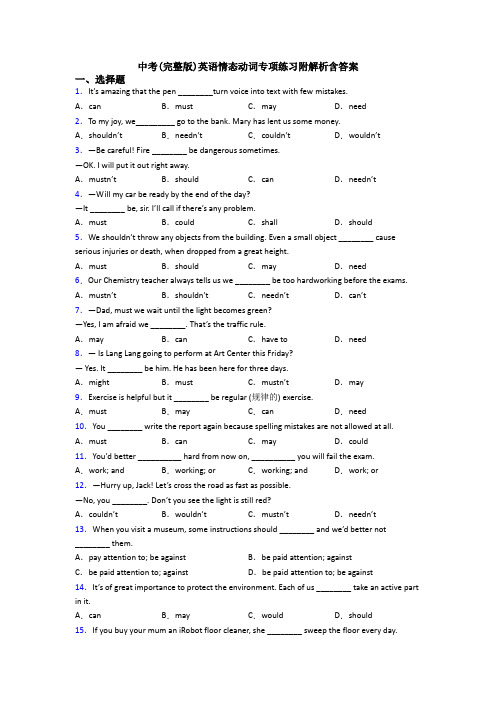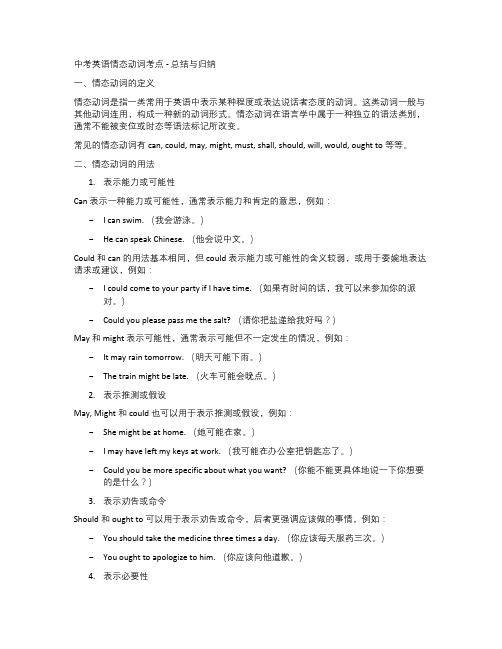中考英语专题情态动词
中考英语复习情态动词课件(共27张PPT).

ought to侧重于表示按照法律,法规等规 定,就强制意义的责任或义务。
should含有个人意见,强调主观看法,语 气比ought to稍弱。
had better
1. It’s raining outside, you’d better stay at home. 2. It’s very cold, you had better not go out.
may表示请求时,肯定回答用may, can;否定回答用mustn’t 或can’t。
二、表示义务类
1. Students must finish their homework before class. 2. I have to go now. 3. Children should learn to respect others. 4. I need type this letter before work. 5. I need to type this letter before work.
must:必须 have to: 不得不 should:应该 need:需要
need 需要(情态动词、实意动词) have to 不得不
三、表示能力类
1. I can draw. = I am able to draw. 2. I could ride a bike when I was six years old.
能,可能,应该, 必须,不得不,需要
最好,将要,可以
must表示肯定是,用于肯定句 can 表示可能,用于否定句,疑问句 may表示可能,用于肯定句
“肯定 是”
“不可 能是”
“可能 是”
对一般现 对现在进 对一般过 对过去进 在推测 行推测 去推测 行推测
最新版-英语情态动词专项复习

we can see his name on it .
7
4. need (需要) 既可做实义动词也可做情态动词 1)实义动词 need to do sth 需要做某事
Eg: I need to buy a big house . --- Do you need to buy a big house ? --- Yes , I do . No, I don’t . He needs to borrow a map . --- Does he need to borrow a map ?
Yes ,you may. No, you mustn’t. No, you can’t.
Yes, you must. No, you needn’t. No you don’t have to
Yes, you must. No, you needn’t
1.Must I take the keyboard to the office now ?
2) 情态动词 need do sth 需要做某事 Eg: I need buy a big house .
8
5. have to
不得不
Eg: It’s eleven o’clock . I have to go now .
He has to finish the work first .
请注意: I don’t have to go now .
--No, you __C___.Tomorrow is Saturday .You
may get up later.
A mustn’t
情态动词(17张PPT)初中英语专项复习课件

表示需要、必须,主 要用于否定句和疑问 句中。needn’t常用 于回答must表请求的 否定回答
—Must I finish my homework now?我必 须现在完成我的家庭作 业吗? —No, you needn’t. 不, 你不需要。
注意 (1) must和have/has to均意为“必须”,常可互 换使用。但have/has to是用于强调客观需要,意为 “必须, 不得不”;must用于表示主观看法, 意为“ 必须, 应该”。如:We’ll have to ask Zhang Hong. 我们必须去问张红了。 We must work hard at school. 在学校我们必须 努力学习。
情态动词本身有一定的意义,但不能独立作谓语, 没有人称和数的变化,后面必须接动词原形。常见的情 态动词有:may, must, need, have to 等,具体用法见下表 :
情态动词
用法
例句
表示能力,意为 Sam can speak English well.
can “能,会”
山姆英语讲得很好。
He could have gone home. 他可能已回家了。
中考(完整版)英语情态动词专项练习附解析含答案

中考(完整版)英语情态动词专项练习附解析含答案一、选择题1.It’s amazing that the pen ________turn voice into text with few mistakes.A.can B.must C.may D.need2.To my joy, we_________ go to the bank. Mary has lent us some money.A.shouldn’t B.needn’t C.couldn’t D.wouldn’t3.—Be careful! Fire ________ be dangerous sometimes.—OK. I will put it out right away.A.mustn’t B.should C.can D.needn’t4.—Will my car be ready by the end of the day?—It ________ be, sir. I’ll call if there’s any problem.A.must B.could C.shall D.should5.We sh ouldn’t throw any objects from the building. Even a small object ________ cause serious injuries or death, when dropped from a great height.A.must B.should C.may D.need6.Our Chemistry teacher always tells us we ________ be too hardworking before the exams. A.mustn’t B.shouldn’t C.needn’t D.can’t 7.—Dad, must we wait until the light becomes green?—Yes, I am afraid we ________. That’s the traffic rule.A.may B.can C.have to D.need8.— Is Lang Lang going to perform at Art Center this Friday?— Yes. It ________ be him. He has been here for three days.A.might B.must C.mustn’t D.may 9.Exercise is helpful but it ________ be regular (规律的) exercise.A.must B.may C.can D.need10.You ________ write the report again because spelling mistakes are not allowed at all. A.must B.can C.may D.could11.You'd better __________ hard from now on, __________ you will fail the exam. A.work; and B.working; or C.working; and D.work; or 12.—Hurry up, Jack! Let’s cross the road as fast as possible.—No, you ________. Don’t you see t he light is still red?A.couldn’t B.wouldn’t C.mustn’t D.needn’t 13.When you visit a museum, some instructions should ________ and we’d better not________ them.A.pay attention to; be against B.be paid attention; againstC.be paid attention to; against D.be paid attention to; be against14.It’s of great importance to protect the environment. Each of us ________ take an active part in it.A.can B.may C.would D.should15.If you buy your mum an iRobot floor cleaner, she ________ sweep the floor every day.A.c an’t B.mustn’t C.needn’t D.shouldn’t 16.—Have you decided to take up teaching as career after graduation?—I ________ go abroad for further education instead. But it depends.A.must B.should C.may D.shall17.The boy is very brave.I ________ he ________ the tall tree.A.dare say; dares to climbB.dare to say; dare climbingC.dare saying; dares climbD.dare to say; dares climbed18.---Will you be back early this evening?---Yes, but I ________ be a little late. Our boss sometimes has extra work for us.A.may B.must C.need D.will19.We’ve discussed every detail of this plan and have got everything ready. But still something __________ go wrong. We still have to be very careful.A.must B.should C.would D.may 20.—Amy, I hear you've got many foreign coins._______ I have a look?—Of course, I'll fetch them for you.A.May B.MustC.Should D.Need21.My bike was broken yesterday,so I____walk home.A.might B.had to C.must D.could 22.—Would you please________in that way? That’s not safe!—Sorry. I won’t do it any more.A.not driving B.not to drive C.no driving D.not drive 23.Dr. Zhong Nanshan once said, "To prevent the spread of this disease, we________never be too careful."A.can B.may C.must D.should 24.Don’t cross the road until the traffic lights turn green. A car_______hit you.A.need B.may C.should D.must 25.—Where is Tom? I am considering ________ him about the result of the exam.—Oh. You ________. He has known it already.A.to tell; can't B.telling; needn't C.tell; mustn't D.told; shouldn't 26.You ________ pay too much attention to protecting yourself if you plan to go abroad. A.mustn’t B.can’t C.shouldn’t D.needn’t27.To avoid ________, we’d better ________ the parents’ meeting online.A.gather; hold B.gathering; hold C.gather; holding D.to gather; to hold 28.You ________ require others to do with the problem like you. Everyone has his own way. A.mustn’t B.needn’t C.may not D.shouldn’t 29.—How do you like my new dress?—Well, if I ________ say, it is not suitable for you.A.may B.must C.have to D.should 30.—Must the children leave at six tomorrow morning?—No, they _______. They can have more time to get ready for the trip.A.can’t B.needn’t C.mustn’t D.may not 31.—Mum, why do I have to wear a mask before entering the supermarket?—For your health and safety, you ________ be too careful.A.shouldn’t B.can’t C.mustn’t D.needn’t 32.According to the rule, used batteries ________ be dropped in the red bin for harmful wastes. A.may B.would C.should D.might33.You _________ smoke here! Look at the sign. It says "No smoking".A.needn't B.mustn't C.can D.may34.— Listen! Tom ________ be listening to the music while doing his homework.—Let’s go upstairs to remind him to turn it off.A.should B.could C.would D.must35.—Is that Mr Zhou?—It ________ be him. He has gone to Beijing.A.can B.may C.can’t D.shouldn’t 36.Never throw objects from the building. Even a small object ________ cause serious injuries, or death, when dropped from a great height.A.must B.should C.may D.need37.—The high school entrance examination is coming!— Yes, our teacher tells us we ________ be too careful while taking exams.A.mustn’t B.shouldn’t C.needn’t D.can’t38.— Is the boy over there Tom? He often wears a jacket like that.— It _______ be him. He is absent from school today.A.needn’t B.shou ldn’t C.mustn’t D.can’t39.—Is it really necessary for me to go shopping with a mask on?—I’m afraid you ________ in public. It is not only to protect yourself but also to protect others. A.must B.should C.can D.need40.Look at the floor, Tom! ________ you watch TV while having a meal?A.Should B.Could C.Must D.May41.Cars ________ give way to walkers on some roads in Binhai, or the drivers will be fined. A.may B.will C.can D.must 42.Sometimes smiles ________ be false, hiding other feelings like anger, fear or worry. A.should B.would C.must D.can43.—Could you tell me how to renew the library books?—With pleasure. You ________ come to our desk every time. It’s easier to renew them online. A.can’t B.mustn’t C.needn’t D.shouldn’t44.For the safety of the passengers, objects like guns ________ be carried on board.A.may not B.needn’t C.might not D.mustn’t 45.—The article says that a person’s animal sign decides his personality.—You ________ read it for fun, but don’t believe in that.A.can B.must C.shouldn’t D.needn’t 46.—How beautiful the winter jasmines (迎春花) are!—Yes. These golden-yellow flowers ________ be widely seen in my city in March.A.must B.can C.would D.should 47.—Mum, I bought some strawberries on my way home.—Oh, you’re so sweet. But the strawbe rries ________ be put into the fridge for freshness. A.must B.can C.may D.need48.— What do you think of the show yesterday?— Some of them were really good but others ________ be better.A.will B.must C.need D.can49.—May I have some wine to drink?—No, you ________. You have to drive home later.A.mustn’t B.needn’t C.can’t D.may not 50.—Will Jim come to Yangzhou for a holiday?—He ________come and it depends on how much homework he will have.A.may B.should C.must D.need【参考答案】***试卷处理标记,请不要删除一、选择题1.A解析:A【详解】句意:神奇的是,这支笔能把声音转换成文字,而且很少出错。
中考英语 情态动词 (含答案)

—Wow! This is delicious!
A.must
答案
B.will
C.shall
D.can
B 句意:——尝一尝这个汤,你会喜欢的。——哇!这个很好喝!本题考查情态动词。A:必须;B:会;C:
应该;D:能,可以。根据答句中“这个很好喝”可知此处应该表达“你会喜欢的”,故本题选择B。
5.(2019黑龙江齐齐哈尔,5)—The summer vacation is coming. Have you made a plan for it?
8.(2019广东,42)Dirty air and water are harmful. They kill plants, and even people.
A.can
答案
B.can't
C.should
D.shouldn't
A 句意:肮脏的空气和水是有害的。它们能杀死植物甚至人。本题考查情态动词。can能;can't不
A.must
答案
B.could
C.would
this Sunday.
D.should
C 句意:杰里没有把钱还给我,但是他许诺本周日还我。本题考查情态动词的用法。A.必须;B.可
以;C.会,将会;D.应该。根据he promised及时间状语this Sunday可知宾语从句的时态为过去将来时,故选C
D.needn't
C 句意:——有些人在一开始时没表现出他们的天赋。——我同意。即使爱因斯坦也是到他7岁
时才能阅读。本题考查情态动词。can't不能;mustn't禁止;couldn't不能,can't的过去式;needn't不需要。根
中考英语情态动词考点总结与归纳

中考英语情态动词考点 - 总结与归纳一、情态动词的定义情态动词是指一类常用于英语中表示某种程度或表达说话者态度的动词。
这类动词一般与其他动词连用,构成一种新的动词形式。
情态动词在语言学中属于一种独立的语法类别,通常不能被变位或时态等语法标记所改变。
常见的情态动词有 can, could, may, might, must, shall, should, will, would, ought to 等等。
二、情态动词的用法1.表示能力或可能性Can 表示一种能力或可能性,通常表示能力和肯定的意思,例如:-I can swim. (我会游泳。
)-He can speak Chinese. (他会说中文。
)Could 和 can 的用法基本相同,但 could 表示能力或可能性的含义较弱,或用于委婉地表达请求或建议,例如:-I could come to your party if I have time. (如果有时间的话,我可以来参加你的派对。
)-Could you please pass me the salt? (请你把盐递给我好吗?)May 和 might 表示可能性,通常表示可能但不一定发生的情况,例如:-It may rain tomorrow. (明天可能下雨。
)-The train might be late. (火车可能会晚点。
)2.表示推测或假设May, Might 和 could 也可以用于表示推测或假设,例如:-She might be at home. (她可能在家。
)-I may have left my keys at work. (我可能在办公室把钥匙忘了。
)-Could you be more specific about what you want? (你能不能更具体地说一下你想要的是什么?)3.表示劝告或命令Should 和 ought to 可以用于表示劝告或命令,后者更强调应该做的事情,例如:-You should take the medicine three times a day. (你应该每天服药三次。
中考英语情态动词总结

中考英语情态动词总结情态动词是一类特殊的动词,表达了说话人的态度、意愿、能力、推测等情态。
常见的情态动词有can, could, may, might, must, shall, should, will, would, ought to等。
下面是关于这些情态动词的总结:1. can: 表示能力、许可。
常用于肯定句和疑问句中,一般不能用于否定句。
例如:"I can swim."(我会游泳。
)"Can you help me?"(你能帮我吗?)2. could: 表示过去的能力、许可,也可以用于请求或建议。
例如:"When I was young, I could run very fast."(我小时候跑得很快。
)"Could you please pass me the salt?"(你能帮我递一下盐吗?)4. might: 表示较小的可能性,常用于虚拟语气句中。
例如:"If it doesn't rain, we might go for a picnic."(如果不下雨,我们可能去野餐。
)5. must: 表示必须、推测的肯定。
例如:"You must finish your homework before you go out."(你必须在出去之前完成作业。
)"It's already 9 o'clock. He must be at home."(已经9点了,他一定在家。
)6. shall: 表示将来的意愿,用于第一人称(I, we)的疑问句中。
例如:"Shall we go to the park tomorrow?"(明天我们去公园吧?)7. should: 表示应该,常用于建议、请求中。
例如:"You should take a break."(你应该休息一下。
初中英语中考情态动词考点及练习

情态动词情态动词又叫情态助动词;它们具有以下特点:⑴它们必须与其他动词连用,即:情态动词+动词原形表示说话人对所述动作的看法,如需要、可能、意愿或怀疑等;⑵绝大多数情态动词没有人称和数的变化,即第三人称单数不加-s以be和have 开头的情态动词短语除外;⑶在意义上,情态动词具有“多义性”;例:can既可表示能力,又可表示可能、允许等意义;情态动词的基本用法1. can的基本用法:⑴表示体力或智力上的能力,即“能够,会”,可与be able to转换;例:He can speak English. = He is able to speak English.—Can you play basketball— No, I can’t.如果表示将来具备的能力,要用will be able to;例:If I have a good sleep, I will be able to do the problem.⑵表示许可,主要用于口语,书面语一般用may;例:—Can we go home now, please— No, you can’t.You can only smoke in this room.You can’t keep the library books for more than a month.⑶表示“可能”,与may同义,但一般用在疑问句中;例:What can he possibly want在否定句中,否定形式can’t表示推测“不大可能”;例:Anybody can make mistakes.The news can’t be true.与第一、二人称连用时,还可以就可能的解决问题的方式或可能的行为提出建议;在这里,也可用could使语气婉转;例:Can / Could we meet again next week 下周我们可以再见面吗—What shall we do 我们怎么办呢— We can / could try asking Lucy for help.——我们可以请露茜帮忙试试看;You can / could help me with the cooking. 你可以帮我做饭;2. may的基本用法:⑴表示“许可”,用can比较口语化;例:You may / can come if you wish. 如果你想来,你就来;You may not pick flowers in this park. 本公园内不许摘花;may not表示按规定不许可,如果用mustn’t则表示说话人不许可;我可以在这里抽烟吗—;mustn’t表示明确的禁止;⑵;例:It may rain tomorrow. 明天可能会下雨;;注意:如果,通常用例:那会是真的吗他究竟是谁呢⑶注意—Yes, you —No3. must的基本用法:⑴表示必须,强调说话人的主观意志;例:I must go now, or I’ll be late.You must be here by注意:表示“必须“时,must的否定式为或而不是mustn’t;也就是:—Must—Yes, you—No, you例:——No, you .⑵表示推测,一般只用于肯定陈述句,表示非常肯定;例:She didn’t look at me. She must be angry. 她不朝我看,一定是生气了;He is good at English. He must know the word. 他英语好,准知道这个词;You must be Mr. Jones. 想必您就是琼斯先生吧;4. have to的基本用法:have to可视为情态动词,但它与其他情态动词在用法上稍有不同;其他情态动词没有人称和数的变化,而have to却有人称和数的变化,要视主语的不同而变化;例:I / You / We / They have to….He / She / It has to….You don’t have to….意思是“必须,不得不”;have to强调客观需要;例:Sorry, I have to leave now. 对不起,现在我得走了;I’ve got to go to a meeting. 我得去参加一个会议;Will he have to work deep into the night 他将不得不工作到深夜吗5. need的基本用法:need的基本词义是“需要”,它既可作情态动词,又可作实义动词;⑴ need用作情态动词时,只用于否定句和疑问句;它只有一种形式,后接动词原形;例:I don’t believe you need worry. 我相信你没有必要焦急;—Need we go so soon我们需要这么早就去吗— Yes, we must. / No, we needn’t.是的,必须;/不,不必;So I needn’t tell him, need I 所以我不需要告诉他,对吧请比较以下两句话的不同意思:You needn’t buy the coat. 你没有必要买那件外衣;你还没买You needn’t have bought the coat. 你没有必要买这件外衣的;而你⑵My watch needs mending/to be mended. 我的手表需要修理了;We don’t need to work today. = We needn’t work today.Does he need to go right now = Need he go right now6. had better的基本用法:had bette r常略作’d better;现代语法认为它是一个助动词,因为它后接不意思是“最好做某事;还是做某事比较好”;get some sleep. 你最好睡一会儿;You’d better not do that again. 你最好别再做那件事;What had we better do now 我们现在怎么做才好呢, should, would, might表示推测:①.must多用于肯定句中表示把握性极大的推测,意思为“一定、肯定”;如: You have worked hard all day. You must be tired. 你已辛苦工作一整天了,一定累了;The book must be his. His name is on the cover. 这本书一定是他的,封面上写着他的名字;注意 must不表推测时,在肯定句中意思为“必须强调内在的职责”,在否定句中意思为“不许、禁止”,以它开头的疑问句否定回答常用needn’t或don’t doesn’t have to;如:We must obey the traffic rules. 我们必须遵守交通规则;Cars mustn’t be parked here. 此处严禁停车;—Must we hand in the papers this week 我们必须本星期交论文吗—No, you needn’t. 不,你们不必本星期交;②. can / could多用于否定句、疑问句或间上没有差别;用can时不相信的程度更强一些,如:The man under the tree can’t be Tom人不可能是Tom,他已经去英国了;Can it be true that he was fooled by a five-year-old boy 他被一个五岁的孩子愚弄了,这能是真的吗Could this be an excuse 这会不会是个借口How can you be so careless 你怎么这样粗心③.may / might多用来表示把握性不大的推测,意思为“也许、可能”, might比;注意区分“不可能”与“可能;如:Mr. Wang may know Professor Li’s telephone number.王先生也许知道李教授的电话号码;This might be the key Tom has been looking for.这可能就是汤姆一直在找的钥匙;She may not be there today. 今天她可能不在那儿;一、典型例题中考链接1.—Who is the man over there Is it Mr. Li— No, it ______ be him. Mr. Li is much taller.A. mustn’tB. may noC. can’tD. needn’t2.—Must I go with them tomorrow— No,you ______.A. mustn'tB. shouldn'tC. needn'tD. can't3.—______ I take some photos in the hall— No, you ______.A. Can, needn’tB. Must, mustn’tC. Could, won’tD. May, m ustn’t4.—Dad, must I finish my homework today—No, you ________. You may do it tomorrow.A. needn’tB. mustn’tC. don’tD. won’t5.—The lake is said to be dry. Is that true—It , some kids are swimming in it.A. must be trueB. can’t be trueC. may not be true6.—What is your mother going to do this Saturday—I’m not sure. She _____ go to see my grandmother.A. canB. mustC. may7.—Susan has bought a large house with a swimming pool.—It ______ be very expensive. I never even dream about it.A. mustB. mightC. can’tD. shouldn’t8.—Listen Is Professor Johnson giving a report in the hall —No, it be him. He has gone to Japan.A. needn’tB. may notC. mustn’tD. can’t9.—Let’s go to the West Hill Park by taxi.—Oh, it is not far away from here. We _______take a taxi.A. couldn’tB. mustn’tC. needn’tD. can’t10.—Can you play the piano—Yes, I _______. I often practice it on weekends.A. needn’tB. needC. can’tD. can三、课后练习一、用can, may, must, need, have to, had better的适当形式填空:1.You ________________ return the library book on time.2.I ______________ not find the way to the hospital. _______________ youshow me the way3.—________________ I finish the work right now— No, you ________________ not. You ____________ do it later.4.He said he ________________ not come tonight.5.Her mother was ill. She ________________ stay at home and look afterher.6.It’s time for class. You ________________ stop playing football oryou __________be late for class.7.We ________________ start right now, or they would get there first.8.The cloud is lifting, so it ________________ not be a rainy daytomorrow.二、选择填空1.—Do we have to finish our homework this afternoon—Yes, you ________.A. mustB. canC. mayD. need2. —Must I be in hospital for a week, Doctor—No, you . You can go back home tomorrow.’t B.needn’t C. must3. The desk is not dirty. You _______clean it.A. mustn’tB. shouldn’tC. needn’t C. can’t4. —May I watch TV for a while—No, you _______. You have to finish your homework first.A. shouldn’tB. needn’tC. mustn’tD.won’t5.—Is Jessica giving us a speech this evening—No, it ________be her. She________ to Japan.A. mustn’t; has goneB. mustn’t ;has beenC. can’t ;hasgone D. can’t ;has been6. It’s the library So you________ know shouting is no t allowed here.A. canB. mustC. needD. may7. Boys and girls, don’t forget your report . It ______ today.A. can’t finishB. can’t be finishedC. should finishD. should be finished8.—Mr Smith must have been to your home this morning.—No, he ______ ,because he didn’t know my address.A. couldn’tB. can’tC. mustn’tD. may not9. —Must I mop up the window now—No, you________.’t B. can’t C. shouldn’t D. mustn’t10. —Is Lucy knocking at the door—No. It ________ be Lucy. She is in Japan now.A. needn’tB. mustC. can’t11. —Another cup of coffee—No, thanks. I _____ be off. Mary is waiting for me.A. canB. mayC. mustD. might12. —I’m a little tired. Let’s go to t he zoo by taxi.—We take a taxi. It’s not far from here.A. can’tB. mustn’tC. couldn’tD.needn’t13. If the traffic light is red, you ________ cross the road. It’s very dangerous.A. don’tB. mustn’tC. needn’tD.wouldn’t14. —Must I finish watering the flowers now—No, you________.A. mustB. won’tC. needn’tD. can’t15. —I can’t give up smoking, doctor.—For your health, I’m afraid you ________.A. mayB. canC. have toD. must。
- 1、下载文档前请自行甄别文档内容的完整性,平台不提供额外的编辑、内容补充、找答案等附加服务。
- 2、"仅部分预览"的文档,不可在线预览部分如存在完整性等问题,可反馈申请退款(可完整预览的文档不适用该条件!)。
- 3、如文档侵犯您的权益,请联系客服反馈,我们会尽快为您处理(人工客服工作时间:9:00-18:30)。
易错警示
—Could I come later tomorrow? —Yes, you _______. A. can B. could C. do D. can’t
【点拨】could也可表示请求,语气委婉,主要用于疑问句,不可 用于肯定句,肯定回答应用can,否定回答可用No, I'm afraid not.
4. 具有助动词作用,可以用来构成否定句,疑问句及用于简单回答。 We can't carry the heavy box. (否定句) Can you sing an English song? (疑问句) →Yes, I can. / No, I can’t. (简开头的一般疑问句,否定回答常用mustn't。 May I dance here after dinner? →No, you mustn't. (否定回答)
【答案】A
高频考点
(海南中考改编)
—Is that Mr. Zhou?
—It ______ be him. He has gone to Beijing.
A. may
B. can
C. can’t
D. mustn't
解析:考查情态动词表推测的用法。由答语He has gone to Beijing “他去北京了”,可推断那个人不可能是周老师,表示否定推测。 答案: C
(黄冈中考)
—Must I finish reading the book today, Mr. Brown? —No, you __________. You can finish it in two days.
A. needn't B. mustn't C. can't D. couldn't
解析:考查情态动词的用法。句意:你应该为你的错误向 她道歉。should“应该”是情态动词,后加动词原形。 “道歉”动词的英语表达是apologize。 答案: apologize
解析:考查含有情态动词的否定句形式。句意:男孩子们 下午可以下象棋。can“能;会;可以”是情态动词。含有 情态动词的肯定句改为否定句时直接在情态动词后加not。 答案: can’t play
(柳州中考)
You should ___a_p_o_lo_g_i_z_e___(道歉) to her for your mistake.
2.以 Must开头的一般疑问句,否定回答常用needn't/don't have to。
Must I read books every day?
→No, you needn't.
(否定回答)
/No, you don't have to.
3. 情态动词表推测。
(1) 在肯定句中一般用must (一定), can/could(可能), may/might (也许, 或许)。
It can’t be the headmaster. He has gone to America. He will be back in two weeks. He may not know the scientist. I’m not sure.
易错警示
_______ she_______ her uniform to school today?
解析:考查情态动词的使用规则。句意:—布朗先生, 我必须今天看完这本书吗?—不,你不必。你可以在两 天之内看完这本书。must引导的一般疑问句,否定回答 用needn’t,意为“不必”。 答案: A
(重庆中考)
The boys can play chess in the afternoon. (改为否定句) The boys __ca_n_’_t_p_l_ay___ chess in the afternoon.
He may know the answer to this question. It is cold in the room. They must have turned off the heating.
(2) 在否定句中用can't / couldn't(不可能),may not/ might not(可能不)。
A. Need; wear
B. Does; need wear
C. Does; needs wear
D. Need; wears
【点拨】need作实义动词时,有两种用法:1. need to do sth.需要 做某事 2. need doing sth. 需要被做某事(=need to be done sth.); 作情态动词时,后加动词原形,通常只用于疑问式或否定式。
定义
本身有一定的词义, 表示说话人的情绪、 态度或语气的动词。
常用词
can (could), may (might), must, shall (should), will (would), had better, have to, need 等。
用法与特点
1. 有一定的词义,但并不完整,必须与实义动词一起构成谓语。 I can sing very well. She can dance beautifully.
2. 后接动词原形,即不带to的不定式。 She may lose her way in the village. You must do it now with his help.
3. 无人称和数的变化。 We must stay here at this time. He must stay here at this time.
